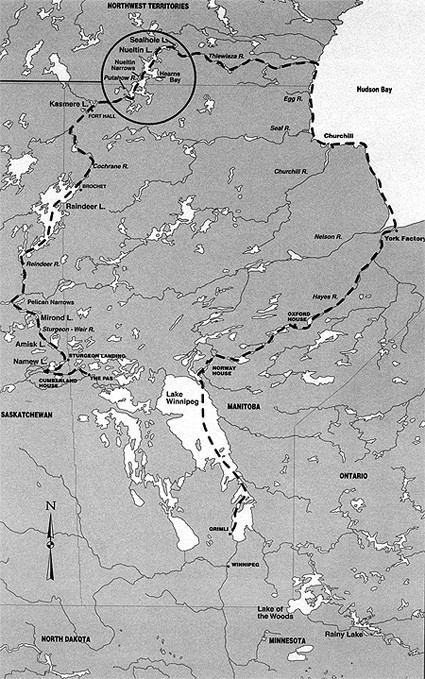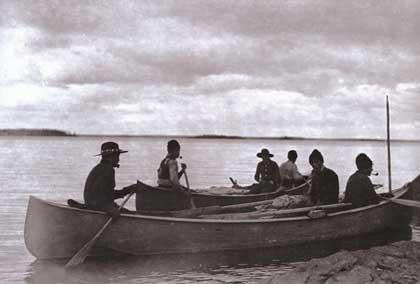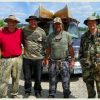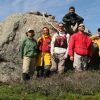Celebrating the Oberholtzer-Magee 1912 Journey to Hudson Bay
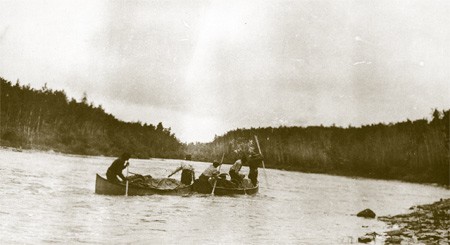
One hundred years ago, wilderness activist Ernest Oberholtzer and Billy Magee, his Ojibwe canoeing partner and friend, paddled and portaged over 2,000 miles from The Pas, Manitoba to Hudson Bay and back. In June 1912, they set off from end of the railroad line to explore rugged, unmapped territory up the Saskatchewan River, and north to the 170-mile Reindeer Lake, Kasmere Lake and Nueltin Lake. At the north end of Nueltin, they paddled off the map and into uncharted territory.
The journey put Ober on the map as a leader in the movement to preserve the Boundary Waters Canoe Area as a wilderness. Canoeing.com commemorates his journey with weekly excerpts and photos from Ober’s journal, reprinted and recently published in Bound for the Barrens: Journal of the Ernest Oberholtzer & Bill Magee 2,000-mile Canoe Voyage to Hudson Bay in 1912 – Edited by Jean Sanford Replinger with Nancy Paddock.
UPDATE:
Final Week of the Trip—Northern Lake Winnipeg to Gimli and Home
November 3
A clear day after a clear night. Brilliant sunrise among fleecy clouds. Beautiful coloring of the rocks, trees, water, and sky. Heard a gun twice on the west shore. Slight haze in the distance. Real Indian summer. Not cold but freezing still.
We knocked the ice off the canoe and waited awhile beside the fire for the wind to drop. Then paddled inside the islands and down the east shore in a strong head wind…
Paddled on till half past two among the many shoals on this part of the coast. Saw a smoldering fire at one place. Cold and confusing in the dark. Sky soon overcast. No moon. Tried to land in bays, which were full of floating ice. Wind rising from the west. Camped at last among poplar trees in a little bay.
November 5 American Election Day
Reached point near Gimli at half past one o’clock and Billy cooked lunch while I walked into town to send a telegram….
Took Billy to one barber shop while I went to another. Returning to the hotel I did not recognize Billy sitting in the office. He had ears again and looked a new man…
Learned to my amazement of the Bulgarian victories in Turkey and of the Roosevelt exploits. Telegram from home.
A warm bath before bed.
November 8, After taking trains from Gimli to Winnipeg and then St. Paul, MN
Registered at the Ryan Hotel, St. Paul. Wired Associated Press and received negative reply about my story. Bought birthday present for Mom from Manheim and talked with a young man of the firm.
Took a walk to the capitol and visited the public library. Left on Burlington at half past eight.
November 9
Arrived Davenport [Iowa] half past six in the morning. Mom sat at the station, looking very well. Dinner that night at French’s.
Week of October 20-27, Wind and Snow on Lake Winnipeg
October 22
It was a clear morning, only a little below freezing point, and with a light south wind. It was hard to understand why the lake was so perturbed, liked Hudson Bay the morning we had to go ashore. The only way we could tell the direction of the wind was by looking up through the tree tops at the light clouds. But about ten o’clock the wind came in earnest, skidding the snow off the boughs in small wet avalanches. I had to go to bed to keep dry.
October 24
I sat a while trying to think up stories and then took a long walk along the sands to the point near Spider Island. I might have been at Brighton or some other sea resort, so firm were the sands, the air so bracing, and the sun so bright. All the way the beach is strewn with boxes and barrels and other lumber partly buried in the sand. Within one mile, I saw three sail booms and a heavy mast 20 feet long. There were also a number of large old boats and a lot of timbers riveted together. The only living creatures I saw were the little snowbirds picking on the water’s edge and a white owl that glared at me a long while in bewilderment and then flew away over the trees…
In the afternoon we aired all our things and Billy cooked, expecting the wind to drop at night fall. Prepared to start in the night by retiring early. But the wind kept up without change. I was awake again and again through the long moon-lit night and always heard it. The air was mild and dry.
October 26
Wind dropped at sunrise after four days and five nights continual blowing.
October 27
At daybreak I felt snow blowing in the side of the canoe. The ground was white when Billy rose at about eight o’clock. The lake was again too rough for travel and snow was still falling…
When Billy walked down the beach where I had just been looking for a better camp place, he found the tracks of four or five small wolves around my own. Mine were already partly filled with snow; the wolves’ were fresh. He had heard these animals howling the night before. He says the small onces are the worst—the hungriest.
Week of October 7 – 13, Winter Sets In
October 9
Very cold night. Ice along shore. Canoe full of frost.
October 10
Night again very frosty… Hard paddling all days. … Made our way through bushes in the evening and found a good camp place on high mossy rocks. Had to break ice to land or embark at most of the portages
October 12
Rain in the night. Up very early and ready to start at daybreak… After lunch the day became somewhat warmer and for the first time in many days we had a good sail. I was able to sit comfortably in the bottom of the canoe while Billy steered.
October 13—Arrived at Oxford House
We sailed along lazily and arrived at the landing just at noon. Mr. Bayer of the Company and his assistant, Mr. Cran, came down to meet us. Bayer gruffly informed me that I would not get through to Norway House before winter and then when he found that I had my own Indian and would not become a burdensome guest invited me up to the house. There his Indian wife prepared Billy and me a lunch.
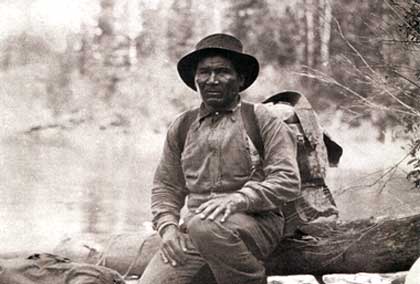
Billy Magee. Tay-tah-pah-sway-we-tong (Ojibwa, meaning far-distant-echo)
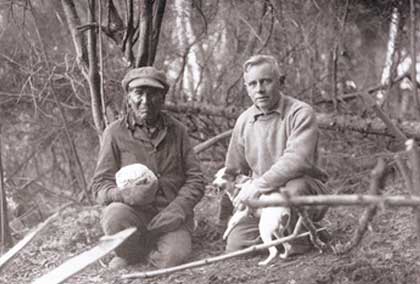
Magee (with cabbage) and Oberholtzer (with Snippy) in later years.
Week of September 30 – October 6, Making Some Progress
September 30
The tide came in gently, the wind was only moderate, and the night became clearer than the previous one. We were able to follow the shore quite easily in the reflected moon-light. Now and then the moon peeped through the puffs of the great quilt of clouds, that extended like a cornucopia from the south-east; there was a fringe of aurora. Hour after hour we paddled on wearily but strenuously in the chill wind.
Round my feet I wrapped my heavy jacket for warmth. Little particles of ice formed in the side of the canoe. The breakers rolled in heavier and heavier. With all my resolution I held off from shore till I thought the tide must have turned. It should then have been midnight.
October 1
The grayness of the seas and heavens sent a strange gloomy ache through the body and made me recall all the things I had heard about the malign influence of the moon. I seemed to be moving in a nightmare. The waves of the head-wind bobbed up and down under the canoe and I hardly knew I was paddling. I counted incessantly and watched the stars. At last, I looked at my watch, which said two-o’clock. “Daybreak still three hours off” I thought. Soon looking again, I saw that the watch had stopped at two.
October 3 Ober hiking to York while Billy paddles with another man.
When I came opposite the fort at last, I waved. Then I put my red handkerchief on a stick and shouted. I saw several figures running about and soon a canoe put out with a sail. To my dismay it went straight up the river. The tide was now driving me back. I took refuge on a hummock of mud, which partly sheltered me from the wind. I began to realize that that it would be possible to starve not half a mile away from the fort. I had just a bite of chocolate in my pocket. Suppose a three days’ wind and snow storm should keep Billy up the creek…
I was drying myself beside the fire, when I saw something black moving up the river. Though I had long given up hope of Billy’s arrival, I immediately sat up. Soon I saw that it was a canoe and as shouting or firing the revolver in the wind was useless, I burned two wisps of hay. The canoe turned at once… Jimmie and Billy had been hunting all over for me, which accounted for their delay. It seems that Jimmie’s canoe was at the mouth of the river and that, when they found it untouched, thought something had happened to me.
October 5 Ober departs from York with Indians that insist on guiding him over a set of rapids
We waited an hour and a half for the Indians to catch up. We saw them at last, sails up and one man in each canoe at the oars. They were working very hard but the wind had grown much stronger. All afternoon we raced and in the evening camped on a steep shore, the Indians above, we below.
October 4th, Swampy Cree river men in canoe. Hayes River, between York Factory and Oxford House.
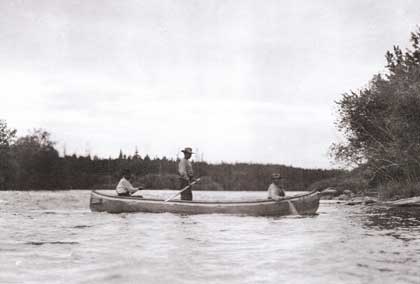
October 7th, Swampy Crees. This was Ober’s last picture. Note: With winter closing in, time running out, and perhaps out of film, Oberholtzer stopped taking photographs, and he and Billy concentrated on getting home alive.
Week of September 23 – September 29, Slowed by Wind and Cold Weather
September 23
A heavy west wind kept us in camp all day and played most surprising pranks with our dishes. Sparks from the fire burned up all cloth within twenty-five feet in any direction. Smoky and cold. Flurries of hail and snow. Even the high rock walls, where we made the fire, did not keep out the wind; they only deflected.
September 24
Wind still blowing hard when we rose at seven o’clock. Ground settled in the crevices with snow.
September 27
Listened for some time to the occasional flurries of snow against the canoe. Got up at five o’clock. Very light north breeze but the sea was rough. The tide came in, in huge breakers, making it impossible to launch the canoe. This was a great disappointment. Sky still overcast. Temperature just above freezing point. Had slept snug and warm under the canoe, but still felt very wary.
September 28
I sat up till ten o’clock, watching tide and sky. The full moon rose at seven and at eight the wind changed to the south. The tide came in smoothly but the night looked too dark. Conditions were almost ideal for traveling—moonlight, a warmer wind, and fairly quiet sea. Only the courage was lacking to face the same difficulties as in the morning at night and to make Bill face them. Billy seemed jubilant when I decided to go to bed.
September 17 – 22
September 17
Editor’s note: On Hudson Bay, Ober and Billy began traveling with an Eskimo family and using their boat to travel while pulling the canoe behind.
Soon the canoe had to be hauled aboard to prevent it filling with water. The waves carried it sidewise till the rope nearly pulled the bow under. A little beyond we came to a long point of boulders which looked impassable; but after the sail had been hauled down, we poled through with only a few bumps…
Again a few miles farther the boat had to be steered with great care through a maze of stoney reefs called “Oh-pin-nay-wee.” Both points were marked with standing sticks, probably erected by the eskimos and not growing… Ahmat again cooked lunch under the usual difficulties. Once the stove fell over and his fry pan full of bannock dropped in the fire; but his good nature only made him snicker… Every time the canoe had to be changed or the sail altered, there was great merriment and the good humor was infectious.
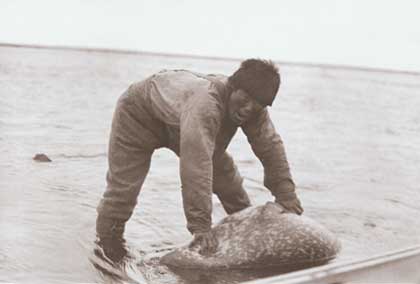
September 18th, Hudson Bay, Bite with his catch
September 18
Just as I was finishing a large meal of fat goose, the men called my attention to the boat which had tipped over in the low tide. When I ran down to the shore, I quickly saw that the boat had filled with water. This meant the probably destruction of all my things, including the pictures. Only my camera, blankets and lunch packs were ashore.
The eskimos paddled me out in the canoe, helplessly looking on at the wreck till I jumped in the half filled boat and began fishing out the water-bulged packs. The film sack was floating on top; I untied it as soon as I got in the canoe and there to my great delight and thanks to the care I had taken to pack it in a food sack, the films were not touched. All else in the pack was soaked.
I called and called Billy but he was nowhere to be seen. I had to carry all the steaming packs through the water and across the oozy mud to the high land. Billy came along with a few sticks of wood just as I brought up the box of tea, which in my anger threw at his feet. Slimy medications, swollen tobacco, gummy deerskins, cloths, tent were all laid out in the rocks. The men sorted the bad from the good packages of tea and kept the bad; rubbed the numerous needles with duck fat; and put the tobacco before the fire to dry. Two great heaps of crumbled hard tack shared the hearth with the tobacco. Many things had to be thrown away at once and nothing dried in the few hours before evening.
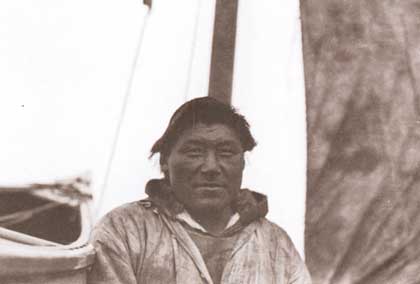
September 19th, Hudson Bay, Ahmak
September 19 Button Bay (at Fort Churchill)
From the men I understood that we were a short walk from the fort. Accordingly, we all started across the rocks and bogs and creeks with our personal packs. Finally, we came to a path which led over to a number of lighted buildings. I was guided to one of them and, at knocking, found myself face to face with a lady, who said the H.B.C. was miles away. Her husband, Major Demers of the Mounted Police, sent us over to the barracks where Constable Percy Rose got out of bed, made supper, and gave us a royal welcome. I talked to the men till nearly midnight, sitting in the kitchen by the warm fire.
September 22 Left Fort Churchill for York
We had a good dinner at the barracks, bade everyone good-bye, and started off at once in a light northwest wind. Paddling was easy and we shipped no water, though the swells were large. Many ducks. The wind was rising when we camped for the night at the first long point. Found a small sheltered sand beach, where the landing was good and the high rocks kept off some of the wind and drizzle. Plenty of large driftwood. Slept under the canoe.
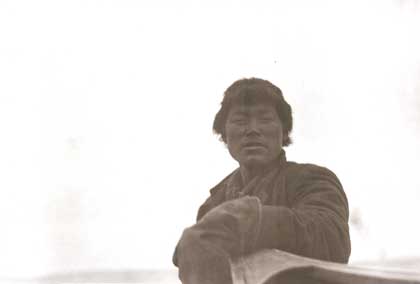
September 19th, Hudson Bay, Bite
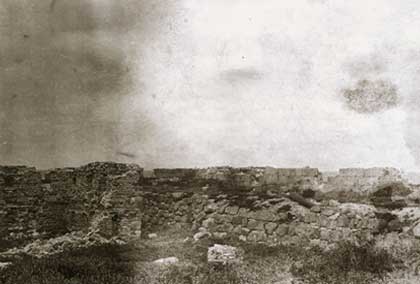
September 20th, Hudson Bay, Ruins of Fort Prince of Wales
Week of September 9 – 15, Reaching Hudson Bay
September 11
In spite of our good camp ground I had a restless night and Billy said I made dreadful noises in my sleep. The threatened storm had quickly retreated and left a perfect night. I started the day wrong by putting all the packs wrong end to in canoe and from that time on things seemed to go wrong. The lake we were in proved to be large and on account of its low shores looked larger yet. It went almost straight east and we naturally followed it. But by the time of our second breakfast, we had explored several blind bays at the end and saw that the river must go out of the north side… About nine o’clock we discovered the river, broad and swift, flowing for a short piece north-west and then eastward. It was so broad that in still places we often had trouble to know where to go.
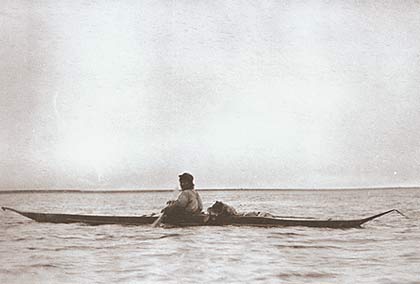
September 12th, Hudson Bay, Eskimo man, Bite, in his kayak
September 12 Reached Hudson Bay
The river quickly broadened to a mile or more and we soon saw with fresh hope a great opening before us. Low, stone shores and islands—with grasses all yellow and brown. Soon after I had tasted the water, Billy saw two queer columns shifting against the gray eastern sky. If not smoke, he said, he had never seen anything like them before. Then, while we were marveling at the phenomenon, I saw something black moving on the water and presently there was a boat coming toward us. I saw at once that it was an eskimo in his kayak.
Swinging his double paddle slowly from side to side and with two little red flannel streamers from each end of his boat, he came up beside us, and extending his paddle for me to take hold, shook hands. Then with easy strokes he led the way over to his camp on the north shore, while I examined the kyak. It was long and had a prong at each end and in the middle of the flat top there was a round turret, in which the paddler sat just like a miniature torpedo boat. Over all the yellow seal skin was drawn tight and on either side various poles and spears.
September 15
I had been awake several times to shift my position and the boat instead of rolling was now lying on its side. When I looked out at four o’clock, the sea was all gone and we were lying among sand and rooks.
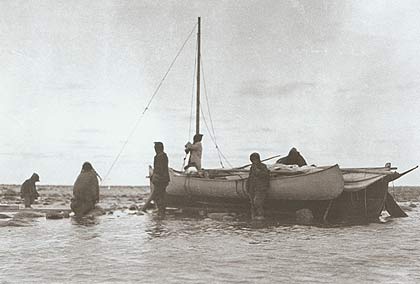
September 15th, Hudson Bay, Lashing the canoe to Bite’s whaleboat
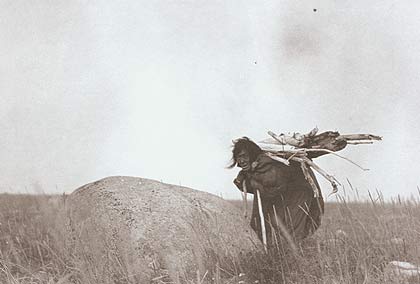
September 17th, Hudson Bay, Old woman with walking sticks carrying wood
Week of September 2 – 8, Slowed by Portages and Weather on the Thlewiaza River
September 2
We soon found that a poor welcome awaited us. The walking in the portage was the worst I have ever known—one mile and a quarter across huge boulders with only here and there a slight filling in of moss.
We took the canoe part way down a channel at the back but long before we could get across, night fell. The black flies had been so bad that I had to use my lotion. There was not a stick of wood in sight, our feet were soaking from the buses, the only level place of moss was drenched with rain and the evening threatened other showers. I worked very hard trying to carry the canoe part way alone and Billy got to the hal-way point, where we had left our blankets. Then, while I went across in the dusk to cover the packs at the point and to bring back some food for supper, Billy forwaged half a mile or more to get a little wood. We had cocoa and pemmican and bannock and then went to bed under the canoe.
September 4
The river gets shallower and shallower until I saw with reluctance that canoeing was out of the question. Instead of the two mile or so along the shore, I succeeded in finding a short-cut across the hills three quarters of a mile long… The footing was fair except in the swampy places round several little tarns. We had dinner at the beginning and we camped at the end at five o’clock. During the afternoon the sky had grown streaky and gradually overcast. The air was close and the black flies very bad. I had to use my net for an hour before sundown.
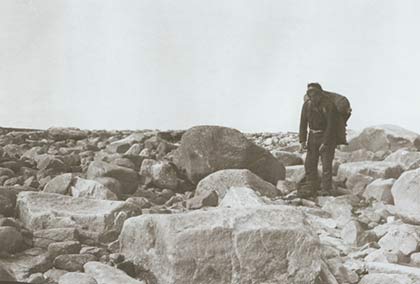
September 4th, Portage Rapids on the Thlewiaza River, Billy tumping duffel on top of Duluth pack
September 5
All around is riotous color—the distant blue hills, the nearer rides of gray and ochre and crimson, and the sea of crimson and yellow herbage around our tent. For our fire we use a lot of old wigwam poles.
The east wind became stronger with a few drops of rain. While I was waiting in the tent, I read again Mr. Tyrrell’s report and realized how serious our position was beginning to look. Bad weather was undoubtedly near and we had no notion how far we were from Churchill. Probably the worst of the Barren Lands was to come and we were travelling hardly more than five miles a day and both of rheumatic. But while Billy slept, I tried to check my impatience.
September 6
The wind continued all night and at daybreak drove a fine rain before it. Had to turn in the rubber blanket to keep off the wet, slapping sides of the tent. I had a restless night and Billy says I talked in my sleep. After breakfast at about nine o’clock, we went back into the tent, where I looked over all my maps and papers. The prospects for reaching home or even Churchill before winter look very dark, but I am resolved to make a desperate try.
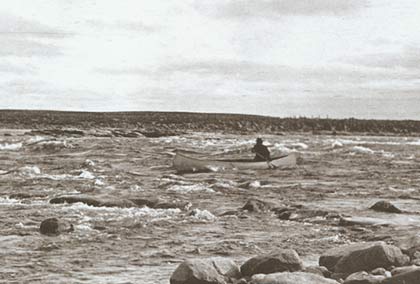
September 9th, Thlewiaza River, Rapids out of Edenhon Lake. Note: The canoe is an 18-foot Guide Special built by Chestnut Canoe Company in Fredericton, New Brunswick.
Week of August 26 to September 1—Searching for the Thlewiaza River
August 27
I climbed the hill for a view of the water ahead which seemed to be a bay about eight miles long. We paddled north toward what seemed the only possible opening and I could feel Billy’s paddle drag when it turned out to be only a small bay. From there we had to go almost west, which was discouraging, but suddenly after several miles, we came to some bold sand cliffs… I even took a picture of the cliffs, feeling sure we were at the entrance to the river… There in a few minutes we beheld once again a great lake extending from beyond view to the north.
August 28
We traveled north along the east shore for an hour till we found we were in a bay from which it was necessary to paddle several miles west between a narrow shallow opening to reach the main lake. The lake looked very dreary, monotonous wavy ridges on both sides, heavy, thick, wet clouds overhead, and only a streak of saffron and green in the east where the sun was struggling to get through… Our course lay north-east another hour’s paddle until we came to an opening in the east. As the lake did not appear to extend much farther north we felt obliged to explore this bay.
[After looking into three or four bays] somehow we had the feeling that we were near the river. The ridges looks as if they owere on the brink; all the land to the east seemed lower. Yet there was no large opening. Finally… I noticed that the weeds were pointing the same way… The water did extend half a mile farter at least and there the next moment… we noticed a slight current, which became stronger at the next narrows and brought us to the head of a rapid.
[The Outlet of the Thlewiaza River]
Here we had our first real mishap. I misjudged the distance between the shore and a certain protruding rock, round which the water has a big fall… the canoe stuck tight and quickly filled with water.
The water flooded, in over the packs, even while I was hurling them ashore; and the good things that were being lost in each one flashed across my mind—all my pictures, my camera, the notebooks, the cask of tea, the hardtack in the jumbo pack, and finally (when all else was ashore) the beans. I was sure they had gone, but no, there they were on shore; and I must have taken them out.
Then I saw the bag of pots and plates lodged in the stern and ready to ride away. I thought of our food without pans and once more I jumped in just in time to save the cooking utensils. We could not pull the canoe back. It was full of water and wedged tight. When we pried it loose, it turned over and Billy came tumbling out and took stock of our damages. One spoon and the rifle were missing.
August 31
[Sleeping under the canoe]
I was very uncomfortable all night. Some time in my half-sleep, I drew out my legs and stretched them out in the rain. My knees ached badly and I was cold, the mist came in the side a little. Finally, toward dawn when the wind had veered decidedly to the west, Billy turned the canoe with me in it; and after that I had a fairly peaceful sleep.
September 1
I was up at four o’clock, stiff but rested. The sun was already up and the day promised fair. A dew had fallen but the temperature was not low. Bill appeared after I had started the fire. We had a big breakfast and were off at six.
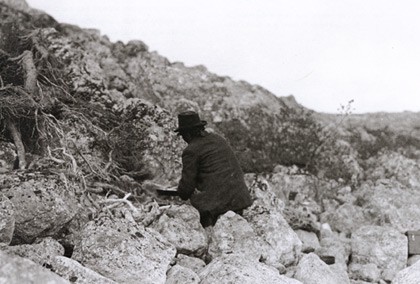
August 26th, Nueltin Lake; Billy cooking bannocks under shelter of some bushes.
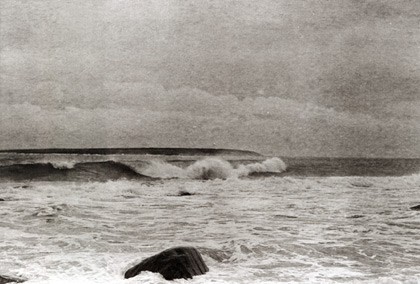
August 31st, Nueltin Lake, Breakers on stoney shore.
Week of August 19-25, Across Nueltin lake
August 19
Since there seemed to be no way open straight north, I climbed a barren island for a view and Billy cooked breakfast. We then paddled west several miles and northwest down a promising stretch of water on the east shore of which I again got out for a view.
Barefoot, I climbed a very rugged summit, from which I could again see a fairly large lake far to the northeast and to right and left among many stony eminences what seemed to be innumerable tarns with no connections… A short paddle north showed us that we were in a bay… After dinner a shower kept us ashore and I was uncertain how to reach the larger water I had seen to the northeast.
[Later that evening], just as I got the tent up between two little white spruce trees and all the packs under the canoe, I saw a huge black cloud tearing down out of the west. Bill and I, screaming to each other in the dark and hurrying across the sand beach with our packs, got into the tent at the very moment the storm broke. There was a terrific wind; it blew loose one corner of the ten and I had our bedding covered with the rubber blanket ready for the worst. In half an hour the worst was over, so that I was able to reinforce the tent and make the beds. Our fire lukily had survived. Still the wind blew hard, from one direction after another.
August 21, Reached the northern end of Nueltin Lake
The day before… we might have been approaching a Pittsburgh or Edinburgh, so like steeples or smoke stacks did the few indistinct trees appear.
August 22, Hawkes Summit
Magnificent view. Hill probably five hundred feet high. Easy to climb, two or three small muskegs between the different levels; strange rostrum-like level places of gravel two or three feet in diameter all the way up. At sunset on a rock at the very top I left a can, in which was a page out of my Welkome Meter book. It gave the date and condition of our supplies and said that we had named the hill “Hawkes Summit” in honor of Mr. Arthur Hawkes [of Toronto]
August 24
From our beach I walked across the deep peat which seems to underlay nearly all these green meadows, to the ridge above. Spires of rock, much weathered, protrude from the top in a number of little peaks. In climbing the highest, I saw five caribou—one of them a lame buck… From the top to the very end of the lake I could see only one possible opening – to the southeast; but the distance was too great to be certain.
Week of August 12 – 18, Reaching Nueltin Lake
August 13, Little Fish River
During a cold shower before we begin the portage, we had dinner. I was out of temper with Billy again because he had let the canoe swing round in the wind at a bad point in the rapid; but he atoned after dinner by carrying the canoe alone. The river here is one continuous rapid and often very shallow. We ran several places on the afternoon, waded and used the rope in others, and at last found ourselves apparently at the end of the river.
August 14
Just above the rapid we saw four good birch bark canoes, which Billy said the Indians had left because someone had died. We kept to the north, where the river runs swiftly over some very shallow sharp rocks and found ourselves near a long heavy rapid running northeast. Billy found a portage from a sort of backwater to the west. This portage, which is about 12 chains long, passes over a sandy ridge strewn with boulders and ends at an old and apparently favorite camp ground of the Indians.
August 15
While we had tea, Billy suggested that the only way to see animals is to walk back in the bush. So, instead of paddling away at once as I intended, I took a walk back over the hill with Billy… We saw three deer; and twice a fair sized gray wolf patrolled the slopes have way down with eyes on the caribou above… Evidently she had eaten one little deer for we found one of his forelegs with a piece of bloody skin attached. There were also three old shelters and signs of fires, where boys had fasted in their desire to become ‘medicine’ men. Billy says they do not begin to practice what they have learned until about 35 years old.
[Entered Nueltin Lake]
Near the end of a long moraine of sand and gravel and stones stretching from the north shore, we got out for half an hour to look for animals. From the high top, where there were scattered white spruce trees of good size and where the Indians had evidently made canoes long ago, we could see much more lake north and east.
August 17
I heard a snarling over in the bay; and, when I looked, I saw a large white wolf and several darker objects moving round among the many trees over in the musket. While Billy was getting breakfast, four wolves, one white, one gray, two black, came out into plain sight.
By five o’clock when the weather had become more settled and slightly cooler with a north wind still blowing, I was sorry I had not traveled all day. I began to realize what an expense it would mean to me to arrive in Churchill much after September 1st, and made preparation for a very early start in the morning.
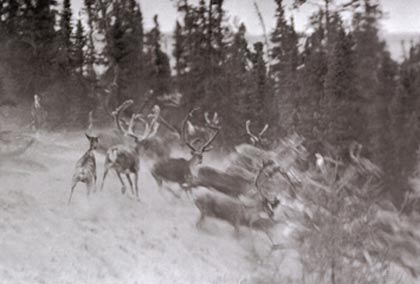
Week of August 5 – August 11 Blue Lake to the Little Fish River
August 6, Blue Lake
I heard Billy whistle and soon he was pointing out to me three large bucks with fine antlers which seemed to me to be still in the velvet. The biggest old fellow had a gray shaggy neck. A number of does and fawns also appeared but soon the foremost buck stopped feeding as if to listen; and then, wheeling round, led them all up the hill at a gallop, the tree bucks circling shoulder to shoulder like circus horses.
We saw ahead of us 17 caribou crossing the narrows and trotting away into the bush and over the ridge and when we came to the shallow narrows where I had to pull the canoe we found the mud on both sides trampled thick with hoof marks.
August 7, Thanout Lake
We saw a number of herds of caribou making the crossing. When I failed to head some of them off for a picture, I shot two partridges instead; and then we crossed over to a long white sand beach on the east shore for breakfast. … At the top-most point some Indian has built a new conical look-out of spruce trees, from which he can see the surrounding country for miles. He looks down upon at least half a dozen sand beaches.
At the nearest one, where the Indians have a camp place, we were about to get breakfast, when we saw about a dozen caribou crossing from the headland to the upper beach.
I ran over the hill barefoot between innumerable caribou bones to the look-out. One picture I snapped from below and just as I came back we saw some fifty large bucks, which I had first spied way up on the opposite beach, start to cross.
Billy ran with me over the hill to the hut and, when the deer got wind of us and started down the shore for our camp, he drove them back in a whirlwind stampede of swaying antlers and thudding hoofs.
August 8
Editor’s note: Intending to paddle for Churchill, Billy and Ober had a hard time finding the river and found an Indian encampment:
The encampment, which proved to be on a cobbly little island at the mouth of the river, consisted entirely of squaws and children, the most intelligent of them a thin keen-eyed boy of about twelve, who pointed out the mouth of the river and who, like the old squaw indicated his inability to understand by exclaiming and putting his fingers in his ears. I first shook hands with two dirty old squaws, the older of whom had the filth caked on her naked breasts.
hey both sat down for a photography, then one of them, in return for a bit of tobacco which I gave each one, brought me a present of a can of deer fat and a red handkerchief of what was probably powdered meat. I had to put my finger in the can and taste the fat, following the old woman’s example, but I did not take her present. Instead, I bought for four plugs of tobacco from a young squaw with a suckling, a good pair of moccasins. In trying to make them understand what I wanted to buy, I so much excited the generosity of one squaw that she took the moccasins off her feet and handed them to me.
August 9 Little Fish River
Just as we were about to land, a doe and her fawns of two summers came trotting down from the sand hill to the water with the intention of crossing the bay; but when we came round the little island, we found them shaking the water from their coasts as if they had plunged in and changed their minds. They had certainly got wind of us and, though not much alarmed, went back into the woods. We camped at once (half past six) in one of the most beautiful places I have ever known. There are three small high sand beaches tapering to gravelly points, the first a deep cove.
August 11
I was up at half past six. The expected rain had not come but the sky was still overcast, the wind blowing from the northeast and a slight drizzle. I thought if it rained I would develop pictures; for it would be cold wading rapids. Billy seemed no displeased with the idea and went back to bed again right after breakfast. All day a northewast gale was blowing but we were on the sheltered side of the point. I developed pictures, washed clothes and shaved; Billy only got up long enough to cook.
Week of July 29 – August 4 Leaving DuBrochet and heading toward Nueltin Lake
July 30
We started out late and spent a lot of time on a few small rapids. We had not trouble finding the portage from the river in the first little lake, but the day was hot and the portaging slow. Arriving at the third portage at about half past seven in the evening there was just time to get our things across. We camped on the sandy ridge above the lake. The mosquitoes (little ones) for the first time, were bad; I had to wear a net and I do not know how many Billy put in his bread. Billy was loathe all day to get his feet wet; and as most of the landings were shallow, I went barefoot most of the time.
August 1
I was up at five o’clock when the sun was just up in the east and the moon going down in the west. All the river was hung in vapor and the woods covered with frost. The water in the bean pot and Billy’s wet socks had frozen solid. He had had an uncomfortable, cold night. We warmed what cocoa was left from the night before and then with gloves on paddled an hour and a half up the river. At one shallow place, I got out and waded—to Billy’s great astonishment, who forgot that it was only the wet shoes and not the water that was cold.
August 4
We had dinner on a little sand beach. Soon afterwards, we sailed up into the right channel through a grassy narrows and a swampy little lake to a very sift deep-channeled river with beautiful sandy banks. Where it cuts through the esker, it is very rock and deceptive. One place is hardly wide enough to let the canoe pass. This is a camper’s paradise: all the banks deep and sandy, the trees well separated, and the ground firm and dry with short herbs. At one of the quiet stretches three miles above the mouth of the river we camped at eight o’clock of a lovely clear cool evening. No mosquitoes. At half past nine we were having summer and the half moon, red and large, was rising across the river among the white spruce. Billy said in his country the half moon never rises before one o’clock.
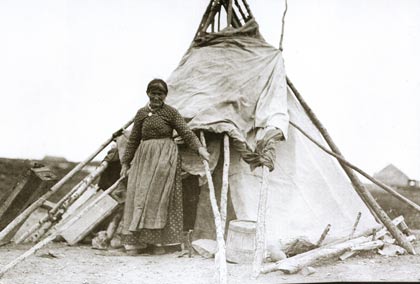
DuBrochet, July 27, 1912 – Old woman outside tepee.
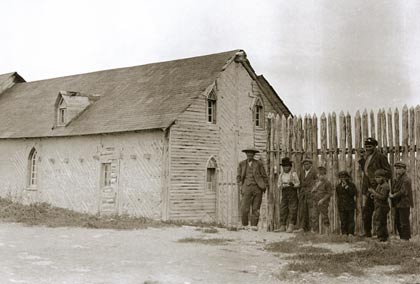
DuBrochet, July 27, 1912 – The Indian named Alphonse Chipewyan and group outside St. Peter’s church.
Week of July 19 – July 28 Big Island Hudson Bay Company Post to Du Brochet
July 19—Big Island H.B.C. Post
Twenty-six large dogs came down to the landing to greet us. Two had porcupine quills in their noses. Some of them looked old and cross and were formidable. I took their picture from the canoe and wrote Mom a letter which I gave Solomon Cook.… I climbed the hill and found more dogs. Billy says that in winter they get a whitefish apiece. In one of the shacks I saw an old man with the consumption [tuberculosis]. The whole settlement sits upon the hill.
In the evening we paddled a long way up the quiet bay before we camped for the night in the moss under spruce trees.
Editor’s note: from the H.B.C. Post, Billy and Ober set out for Du Brochet, which took some time to find.
July 23
I could not sleep well for fear the wind would [cause waves to] wet the canoe or carry off the paddles. At half past six I got Billy up and we set out exploring. We had breakfast several hours later on a sand beach south-west of where we had camped. I shaved, put on my green tie, and took my pipe; all ready for du Brochet. Then I began to feel more amiable. At noon we found ourselves at the end of another long bay with no alternative but to paddle back to our breakfast place for dinner. In the afternoon the wind rose higher and colder and we had hard work reaching the places we wanted…
Toward evening we reached a part of the lake, which again looked hopeful. We found a river, two tepees on a point, a high stone hill, and two deserted shacks at the end of a bay; but there was no village. I felt very discouraged. All we could do was to camp for the night at the point where we had seen the tepees.
July 25
After dinner we paddled up the east coast helped a little by the wind and passing a number of old Indian camps. At about seven o’clock I saw a canoe and soon afterwards an Indian encampment on an island. Some one was playing an accordion. We were so sure we were near the fort that we did not ask. Soon we found ourselves in a bay where the shores were low and the mosquitoes very bad. We came back in search of a sand beach for the night, but there was nothing but stone and tumbled lowland.
July 27 Du Brochet
Du Brochet, with its picketed cemetery and church and numerous clay-covered [colored] houses the south side of a sand ridge, looked a considerable village. On closer inspection, however, most of the buildings especially the H.B.C. store which had a pair of caribou antlers on the gable, proved pretty dilapidated.
Supplies purchased at Du Brochet, Manitoba
4 pencils
4 lbs. beans, $1
10 lbs pork, $4
15 lbs hard tack, $3.75
5 lbs sugar, $1.25
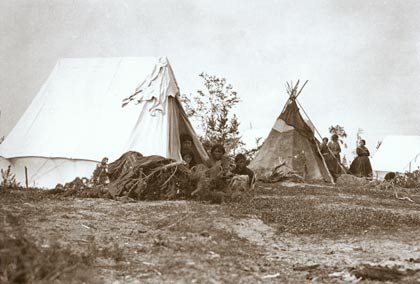
Chipewyan camp, northern arm of Reindeer Lake, July 27, 1912. “We found an Indian encampment- the best one I have ever seen”, E. Oberholtzer
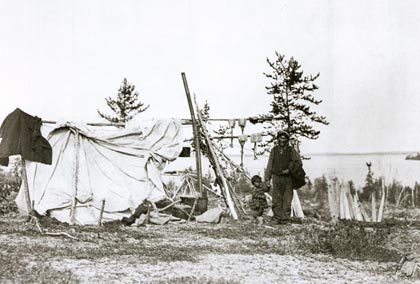
Chipewyan camp man and child, July 28, 1912.
Week of July 11 – July 18
Pelican Narrows to Steep Hill Portage
July 11
The next moment we heard a loud, ominous swish repeated at regular intervals; and there, rapidly approaching, appeared a York boat. They landed in the bay beyond our canoes; one man jumped over the prow; two oars were tied together a a gangway; and down came the whole crew—some twenty men and a squaw with two children.
July 12
I meet Neenin at the priest’s. … He wanted $2.00 a day paid in advance and food for his family. He had not come to a decision when I returned to Thwaites’ house for supper; and that night in the tent I decided to go alone in spite of everybody’s warnings.
*Canoeing.com Editor’s Note: In the beginning of his trip, Ober intended to hire a guide since much of the region was unmapped. Not finding one, he went on “alone,” with Bill Magee.
July 15, Churchill River
The sky was overcast and the great river looked very imposing. Just when I had about given up hope of a good camp ground, we came upon a fair place upon the rocks. Evidently the thunder storm had dropped most of its rain along the river, everything was drenched.
July 17
Northwest wind. A very hard day. A thunder shower at dinner time. We lose an hour going into the wrong bay. Finally camp on an island within sound of the fall at Steep Hill portage.
July 18 [the Steep Hill Portage]
The fall here, which is in three parts is the best so far on the route. In the little lake above we were overtaken at noon by a heavy shower. Across the water we could see a high ridge of what looked like pure red sandstone. It may have been iron-stained.
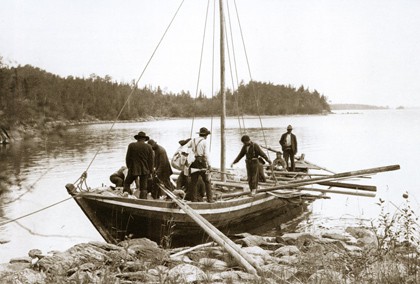
York boat with crew and passengers.
Week of June 26
June 26
Slight showers. I buy more supplies and visit the H.B. factor, who said he had made a long trip the previous year to Port Churchill where he secured a picture of a walrus. Clark says there is a “mint of money” to be made out of an articleabout the Split Lake railway. I decided to go to Cumberland House for a man [guide] and, after a talk with Gidi Halerow, a young French candidate, we start out at 3 o’clock.
[First Days on the Saskatchewan River]
Weather has become settled. A fair wind. Poplars and Willows along the River banks. Crows, swallows, song birds. We make good distance and camp at nine o’clock on a very muddy shore. Billy dips up muddy water with the bucket attached to a long stick.
June 29
I got up at six and took a shave. At half past seven we began to canoe, using the tent as a sail. Soon we met a sow-raft coming down the river… Fine farm land on both sides of the river but timbered. Billy points out some black sand, which he says indicates our gold. Our sail had to be lowered constantly but it helped us many miles.
June 30: Reached Cumberland House
I visit Edward Cadotte, a one-eyed half-breed in the evening. He can not go and I decide to go as far as Pelican Narrows alone. When I return to camp a ten o’clock I Find Billy on duty and everything prepared for a bad storm. Mosqitos excruciating. We just get to bed among our damp blankets, when a fearful storm begins. Powerful wind, lightning and volleys of rain.
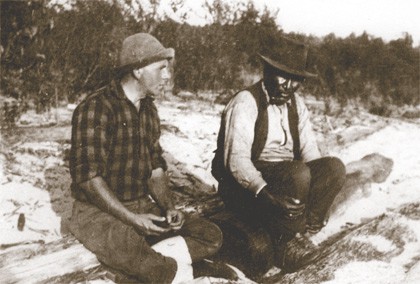
Ernest Oberholtzer and Billy Magee
July 3
Day a little clearer and much colder. During the night a mouse gnawed the tent ropes on top and ate holes in the silk shirt which was hanging out to dry. About eleven o’clock the mist clears and we start up the lake.
July 4
I wake up at half past five after a restless night due to the cold and rabbits. At least one rabbit seemed to be foraging inside the tent and Billy’s show laces were eaten. When I first get up, I go about with the gun [a .22 rifle] looking for the miscreants but they have all fled.
[Sturgeon River]
The poling begins at once. I have never seen it before. … The first rapid seems to be more than half a mile long. Billy and I paddle and wade.
[Goose River]
Great variety of flowers and berries-wild currant, wild onion. A large snake, which Billy says poison “Injuns” but which looks to me like a Garter.
July 7
Rained all night; wind still blowing at half past eight when I get up. We wait till about ten and then paddle a mile or so up into a bay where where we have to wait all day for the wind. Billy catches a little duck by hand.
July 10
Billy is up before me for the first time. He still complains of soreness in his hip. Baked rabbit for breakfast. WE make two portages [Leaf Rapids Portage and Birch Rapids Portage], the longer one about ten chains in length…. Billy says this is one of the camps for catching fish in the autumn. Probably six men work here. They run a stick through the tails of the fish and hang them up to dry. The company buys from the Indians too at ten cents a fish.
Read more – Buy the Book Bound for the Barrens >
